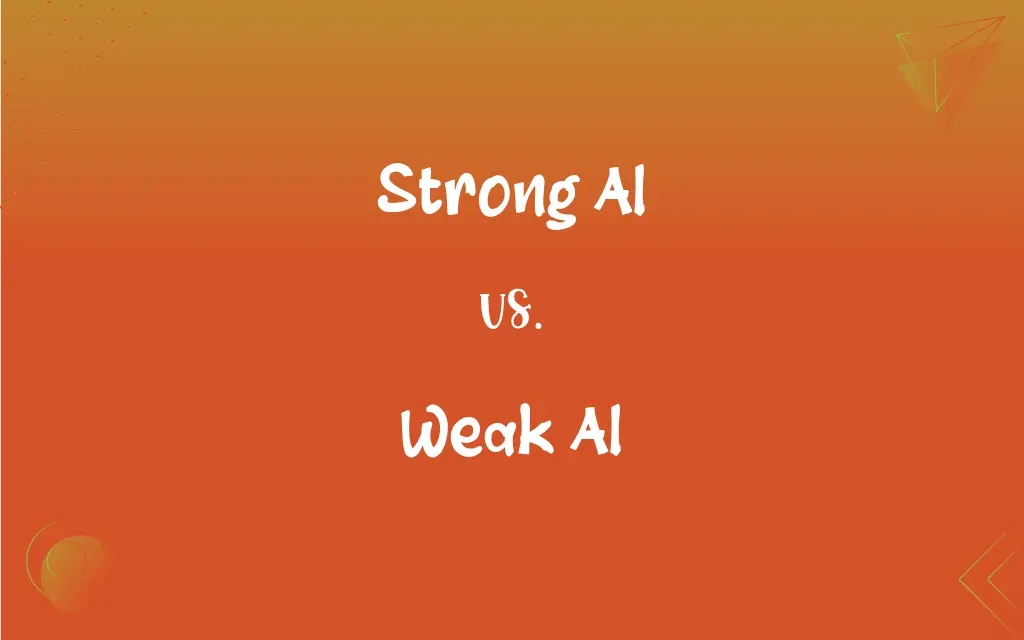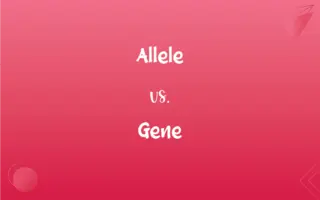Strong AI vs. Weak AI: What's the Difference?
Edited by Aimie Carlson || By Harlon Moss || Updated on October 2, 2023
Strong AI aims for genuine cognitive abilities, while Weak AI specializes in the performance of a specific task without possessing true understanding or consciousness.

Key Differences
Strong AI refers to a type of artificial intelligence that possesses the ability to understand, learn, and apply knowledge across different domains. Weak AI, on the other hand, is tailored and optimized for specific tasks without generalization capabilities.
In the context of strong AI, the intelligence exhibited by the machine simulates human intelligence in all aspects. Weak AI, despite being intelligent in its designed task, does not encompass the broad understanding or consciousness that strong AI entails.
Strong AI not only emulates human-like decision-making but also has the potential to comprehend emotions and exhibit emotional responses. In contrast, weak AI may efficiently solve problems or perform tasks but does not emulate emotional understanding or responses.
From a technological standpoint, strong AI has the theoretical capability to perform general cognitive tasks that humans can, embodying universal learning and problem-solving. Weak AI is strictly confined to the parameters of its designated task and cannot generalize its learning or knowledge to other domains.
Concerning ethical and philosophical debates, strong AI often raises questions regarding consciousness and rights due to its hypothetical comprehensive cognitive abilities. Weak AI usually does not engage in such debates as it does not possess consciousness or self-awareness.
ADVERTISEMENT
Comparison Chart
Cognitive Abilities
Has generalized cognitive abilities
Limited to specific tasks
Learning & Application
Can learn and apply knowledge broadly
Restricted to its programmed domain
Emotional Understanding
Potential to comprehend and exhibit emotions
Lacks emotional understanding
Ethical & Philosophical Debates
Engages debates about machine rights and consciousness
Typically exempt from such debates due to its lack of consciousness
Usage and Implementation
Intended for general, wide-ranging applications
Best suited for specific, narrow applications
ADVERTISEMENT
Strong AI and Weak AI Definitions
Strong AI
Strong AI holds potential to possess consciousness and self-awareness.
Developers hypothesize that future strong AI could question its own existence and purpose.
Weak AI
Weak AI operates under a limited pre-defined set or context, without consciousness.
Siri utilizes weak AI to respond to user queries without understanding them.
Strong AI
Strong AI has the ability to comprehend, learn from, and engage in human interactions and emotions.
Observing the user's stress through their speech, the strong AI adapted its communication to be more comforting.
Weak AI
Weak AI lacks the ability to perform tasks outside of its specific domain.
A spam filter, powered by weak AI, cannot engage in a philosophical debate.
Strong AI
Strong AI aims to genuinely replicate or surpass human intelligence and cognitive abilities.
The robot, with its strong AI, understood the emotional context of the conversation and responded empathetically.
Weak AI
Weak AI does not possess the ability to understand or exhibit emotions.
Although the chatbot, using weak AI, can simulate a friendly conversation, it doesn’t comprehend emotions.
Strong AI
Strong AI can learn, adapt, and apply its knowledge across various unrelated domains.
The strong AI system was able to diagnose a medical condition and compose a symphony, showcasing its versatility.
Weak AI
Weak AI cannot adapt its knowledge and learning to various unrelated domains.
The weak AI in a voice-activated assistant cannot strategize military operations.
Strong AI
Strong AI could engage in complex problem-solving without being limited to its training data or specific tasks.
The strong AI, without prior chess training, derived strategies by understanding the game’s rules and objectives.
Weak AI
Weak AI is specifically designed and optimized for particular tasks.
The chess-playing computer uses weak AI to calculate moves without genuinely understanding the game.
FAQs
What is strong AI?
Strong AI, also known as artificial general intelligence, aspires to possess broad cognitive abilities similar to human intelligence.
What is a significant limitation of weak AI?
Weak AI is restricted to performing tasks it was specifically designed for and cannot generalize its knowledge to other domains.
Will strong AI replace human jobs across all sectors?
While theoretically, strong AI could perform any human job, its practical development and ethical considerations could influence its application in the job market.
What defines weak AI?
Weak AI refers to systems designed and trained for a specific task without possessing consciousness or general intelligence.
Is it possible for strong AI to have emotions?
While strong AI might simulate emotions convincingly, whether it can genuinely experience emotions is a matter of philosophical debate.
Are there real-world applications of strong AI?
No, currently, there are no real-world applications of strong AI since it remains a theoretical concept.
Is strong AI currently existent?
No, as of now, strong AI, which matches or exceeds human cognitive abilities across various domains, remains theoretical.
Can weak AI understand and display emotions?
No, weak AI lacks the capability to genuinely comprehend or exhibit emotions.
Does strong AI possess consciousness?
While theoretically possible, no existing form of AI, including strong AI, has achieved consciousness.
What are examples of weak AI in daily life?
Examples of weak AI include voice assistants like Alexa, and customer service chatbots.
Is the development of strong AI ethical?
The ethicality of developing strong AI is subject to debate, revolving around issues of control, responsibility, rights, and impact on society.
What is the role of weak AI in data analysis?
Weak AI can efficiently analyze large datasets, identify patterns, and provide insights, but it cannot independently derive meaningful, novel conclusions from data.
Can strong AI solve any kind of problem?
In theory, strong AI would be capable of addressing various problems by understanding, learning, and applying knowledge across domains.
Can weak AI create original content or innovate?
Weak AI can generate content based on patterns in data but lacks the genuine creativity and innovative capabilities that arise from understanding and consciousness.
Can strong AI understand human languages fully?
In theory, strong AI would be able to fully understand and generate human languages, considering semantic, syntactic, and pragmatic aspects.
Why is weak AI widely used in industries?
Weak AI is prevalent in industries due to its ability to efficiently and reliably perform specific tasks, enhancing productivity and reducing costs.
What are the potential dangers of developing strong AI?
Potential dangers include loss of control, unintended consequences, use in harmful ways, and socio-economic disruptions, among others.
Can weak AI make moral or ethical decisions?
No, weak AI lacks the understanding and consciousness required to make moral or ethical decisions.
How does strong AI differ from human intelligence?
Though strong AI aims to replicate human intelligence, it would likely process information and learn differently from humans, given its theoretical computational basis.
How safe is it to implement weak AI in critical applications?
The safety of implementing weak AI in critical applications depends on robustness of the design, testing, and its adherence to relevant safety and ethical guidelines.
About Author
Written by
Harlon MossHarlon is a seasoned quality moderator and accomplished content writer for Difference Wiki. An alumnus of the prestigious University of California, he earned his degree in Computer Science. Leveraging his academic background, Harlon brings a meticulous and informed perspective to his work, ensuring content accuracy and excellence.
Edited by
Aimie CarlsonAimie Carlson, holding a master's degree in English literature, is a fervent English language enthusiast. She lends her writing talents to Difference Wiki, a prominent website that specializes in comparisons, offering readers insightful analyses that both captivate and inform.































































